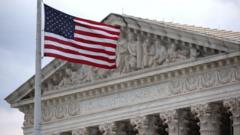In a significant decision, the US Supreme Court has halted public funding for what would have been the first religious charter school in the country, planned by the Catholic Archdiocese of Oklahoma City and the Diocese of Tulsa. The Court split 4-4 on the issue, affirming a lower court ruling that deemed the $23.3 million funding effort unconstitutional under the First Amendment, which restricts government endorsement of any particular religion.
While the tie vote does not set a nationwide precedent, it highlights a larger debate on educational choice and religious freedom in the US. Oklahoma Attorney General Gentner Drummond, who initiated a lawsuit against the school board, praised the Court's decision, framing it as a victory for religious liberty and taxpayer interests. On the flip side, supporters of the charter school argued that blocking funding discriminates against religious institutions, and they expressed disappointment at the Court's ruling. They are now considering alternative methods to provide students with a Catholic education, such as virtual classes.
The controversy surrounding this case sheds light on the evolving perspectives on charter schools, which have become increasingly popular as an option for parents seeking alternatives to public education. While charter schools have gained traction, they remain a small segment of the overall US education system, stirring ongoing discussions about the role of government funding in religious education.





















